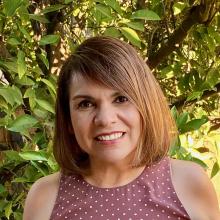How did you choose developmental science as a career?
As an undergraduate psychology major, I didn’t feel as if my lived experiences were represented in the textbooks and articles I read. And, I wondered about the experiences of other youth from similar backgrounds as mine. Navigating through the education system. I became most interested in the roles of families and schools in supporting children along their educational journeys.
Is there a mentor or mentors who have been instrumental to your career path so far, and, if so, who and how?
Brennis Lucero-Wagoner, a neuropsychologist at California State University Northridge (CSU Northridge), mentored me in research and helped me prepare for graduate studies. Initially, I was interested in pursuing cognitive developmental psychology. However, after reading Catherine Cooper and Hal Grotevant's research on individuation in relationships and adolescent identity development, I knew that I wanted Catherine to be my mentor. She treated me as a "professional in training" and helped uncover the hidden curriculum of academia. I don't think I would have gone into academia without her guidance.
What advice would you give to a prospective graduate student thinking about beginning their Ph.D. studies in the developmental science field?
Find a team of mentors who can guide you through graduate studies and beyond. Don’t expect one person to meet all your needs. Also, passion and determination will get you through. I was never the “smartest” in a room full of very smart people, but I knew that I had something that many lacked – ganas – a Spanish term that means “desire,” but it goes beyond that. It is about having a will, desire, strength, and determination to succeed.
What is your best SRCD memory?
My first SRCD Biennial Meeting was in 1997 in Washington D.C. Hilary Clinton was then First Lady of the United States and served as a keynote speaker, and we protested against the government's decision to end the welfare program, affecting millions of low-income children and their families. I felt like I found a community.
Why did you join the Latinx Caucus and how does it facilitate connection among members all year long?
I joined the Latinx Caucus because, after attending several meetings, I still felt like an "outsider," and didn't feel that the organization addressed the needs of Latinx and immigrant youth and families.
We are a familia within the Latinx Caucus. We support one another. And it is a great place to network with like-minded scholars.
